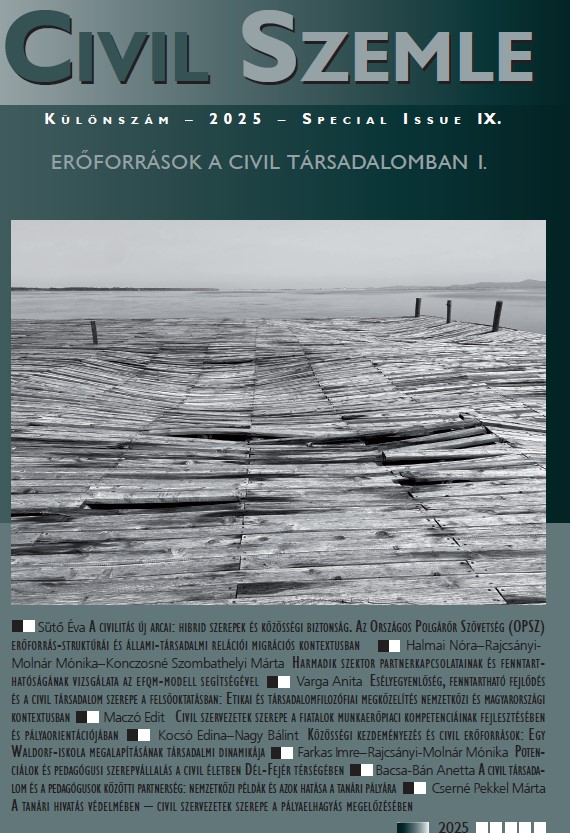Potential and teacher involvement in civic life in the South-Fejér region
Abstract
The livability of a small village is largely determined by the quality of the operation of civil society organisations, which are formed by the inhabitants of the village on the basis of internal motivation, and the community life managed with their active participation. The aim of this study is to present, on the basis of interviews with people who influence the community life of ten municipalities in the South Fejér region, the possibilities for teachers working in the municipalities to get involved in the civil sphere. The current situation and the reasons for any lack of active participation will be described, using good examples. The untapped potential of civil society organisations in municipalities and the needs that could generate new organisations will be explored. The impact of the local school on community life, its links with existing organisations and the degree of cooperation that takes place will be described. The article discusses the possibilities presented by studies published internationally, comparing them with the situation at home and highlighting new opportunities in this field. Recent research also shows that the civic engagement of educators plays a key role in strengthening the social cohesion and resilience of local communities. International experience also suggests that the civic presence of teachers and the active participation of educational institutions contribute to the development of democratic culture and the expansion of community-level participation, especially in rural areas. In this synthesis, the authors draw conclusions on the potential successes of the symbiosis between the teaching profession and civic life for community coexistence, with its negative and positive implications.
References
András, I., & Rajcsányi-Molnár, M. (2014). Profit és filantrópia: a CSR eszmetörténeti kérdései. Civil Szemle, 11(2), 5-24.
András, I., Rajcsányi-Molnár, M., & Füredi, G. (2013). A vállalatilag felelős vállalat: a CSR- és a cafeteria-metszet értelmezési lehetőségei a gyakorlatban. In: Rajcsányi-Molnár, M., & András, I. (szerk.) Metamorfózis: glokális dilemmák három tételben. Budapest: Új Mandátum Könyvkiadó, 127-139.
Alarabi, K., AlSadrani, B., Tairab, H., Abu Khurma, O., & Kasasbeh, N. (2025). Does Community Engagement Boost Pre- and In-Service Teachers’ 21st-Century Skills? A Mixed-Method Study. Social Sciences, 14(7), 410. https://doi.org/10.3390/socsci14070410
Balázs, L., Rajcsányi-Molnár, M., András, I., & Sitku, K. (2020). Társadalmi felelősségvállalás a felsőoktatásban – egy hazai jógyakorlat bemutatása. Civil Szemle, 17(3), 5–25. https://doi.org/10.53087/civilszemle.2020.3.5
Dános, Z. (2021). A társadalmi felelősségvállalás jelenléte a magyar állami egyetemek szervezeti dokumentumaiban. Educatio, 30(1), 125–134. https://doi.org/10.1556/2063.30.2021.1.10
Doe, J., & Roe, A. (2023). The impact of community engagement on undergraduate social responsibility. Studies in Higher Education, 48(4), 789–805. https://doi.org/10.1080/03075079.2023.2260414
Gebremedhin, A., Hevia, F. J., & Hossain, N. (2023). Civil society and national education policy: A literature review. Global Partnership for Education / Education Out Loud. https://accountabilityresearch.org/wp-content/uploads/2023/11/Literature_Review-_civil_society_education_Nov_2023.pdf
Farkas, I. (2024). Kisiskolák kapcsolat a település műveltségi szintjével és a közösségi élettel. Opus et Educatio, 11(1). https://doi.org/10.3311/ope.593
Fu, Q., & Zhang, X. (2024). Promoting community resilience through disaster education: Review of community-based interventions with a focus on teacher resilience and well-being. PLOS ONE, 19(1), e0296393. https://doi.org/10.1371/journal.pone.0296393
H. Tomesz, T., & Balázs, L. (2024). Civil szervezet az oktatás és tudomány szolgálatában. Civil Szemle, Különszám, 97–106. https://doi.org/10.62560/CSZ.2024.05.6
Ilyefalvi, E. (2023). A kiterjesztett olvasás lehetőségei: Elemzések a Voyant Tools segítségével a digitalizált magyar ráolvasáskorpuszon. Digitális Bölcsészet, (7), M:3–M:24. https://doi.org/10.31400/dh hun.2023.7.7369
Kará¬csony, P., & Reichel, B. (2024). Vállalatok társadalmi felelősségvállalása és a munkavállalók elégedettsége. Új Munkaügyi Szemle, 5(1), 23–41. https://doi.org/10.12345/ums.2024.5.1.23
Keszi-Szeremlei, A. (2024). Civil szféra, közösségi szolgálat és az egyetemi hallgatók: Kapcsolódási pontok, fejlesztési lehetőségek. Civil Szemle, Különszám, 81–94. https://doi.org/10.62560/CSZ.2024.05.5
Leach, T., & Bradbury, O. (2024). Equipping Teachers for Success in Rural Communities: Unveiling the Key Characteristics and Attributes of Thriving Rural Teachers. Education Sciences, 14(12), 1384. https://doi.org/10.3390/educsci14121384
Málovics, Gy. (2024). Hazai egyetemi közösségi szerepvállalási gyakorlatok a társadalmi igazságosság lencséjén keresztül. Civil Szemle, 21(4), 71–84. https://doi.org/10.62560/csz.2024.04.4
Molnár, A., & Müllerné, A. (2021). A vállalati társadalmi felelősségvállalás és a munkahelyi egészségfejlesztés kapcsolata. Acta Carolus Robertus, 11(1), 71–81. https://doi.org/10.33032/acr.2580
Pálfi, S. (2018). Civil szervezetek (lehetséges) szerepe a közoktatásban. Belvedere Meridionale, 30(3), 99–105.
Smith, J. A., & Brown, L. M. (2025). Engaging community, expanding consciousness: A study of the impact of community engagement experience on preservice elementary teachers. Journal of Teacher Education, 76(2), 145–162. https://doi.org/10.1080/1547688X.2025.2470246
Smith, P., & Johnson, R. (2024). University social responsibility: The role of teachers. International Journal of Educational Development, 85, Article 102340. https://doi.org/10.1016/j.ijedudev.2024.102340



